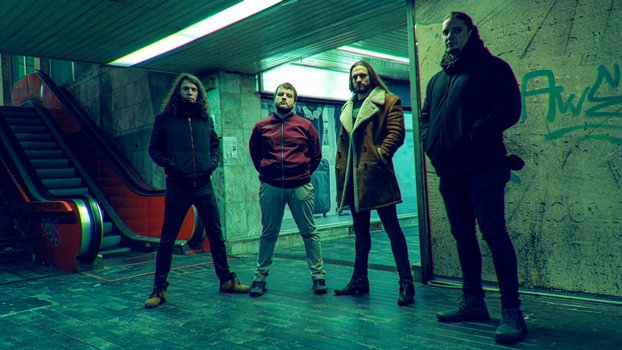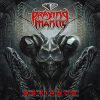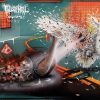Quasarborn – Quest for Identity
Saturday, 7th March 2020
Expanding their horizons from thrash into more progressive and technical avenues, Serbian band Quasarborn possess quality musicianship and songwriting knowledge beyond the average act. Their latest album A Pill Hard to Swallow emphasizes key melodies and hooks beyond conventional influences and a willingness to make music that stands out in a scene plagued with copycats. It’s a style that may not necessarily be in fashion, but for most consumers they’ll gain plenty of new elements through successive playbacks.
Feeling the need to be brought up to speed on the band, we reached out to guitarist/vocalist Luka Matković. He let us know about the demise of Space Eater and evolution into Quasarborn, thoughts on the two albums they’ve recorded to date, insight into the economic struggles that affect the Serbian metal scene – and candid thoughts on capitalism, consumerism, and entitlement that currently reverberates worldwide.
Dead Rhetoric: Quasarborn started in 2016 by ex-members of Space Eater. Can you bring us up to speed on why Space Eater ended, and how the shift in direction into more technical thrash took place with Quasarborn? What were you specifically looking for in terms of the members and did you know right away where you wanted to go in terms of a style or was there a trial and error, feeling out process?
Luka Matković: Tihi (drums) and myself joined Space Eater back in 2009 after Boško Radišić (original Space Eater vocalist & founder, and a huge Serbian metal persona) died in a fire. Karlo (Space Eater bass player) decided to continue with the band, honoring the memory of the late Serbian metal legend. Boško’s vision was very clear – old school 80s thrash with melodic vocals, in the likes of Agent Steel, Forbidden and Intruder. At that time, thrash metal was really popular in Serbia, many bands were forming, and we had a really big and strong thrash scene. Being 19 year old youngsters, it quickly became the center of our lives. However, as we became older, we started listening to more and more different styles of music, our point of view changed, and we wanted to expand our musical expression.
At the same time, the whole thrash revival thing died off, Karlo moved to Germany, and left the band to myself, Tihi and Đorđe (guitars). We recruitet Tomas (bass) who had literary only picked up the bass guitar for that role. Very soon it became apparent that what we wanted to do musically was outside of the borders of what Space Eater was supposed to be. So we decided to move on. Quasarborn’s first record was actually written for Space Eater originally, and we just added some flavors here and there to make it stand out even more. So, you could say A Pill Hard to Swallow is the first real Quasarborn-exclusive album, (laughs).
Dead Rhetoric: How did the idea come about to release a three-song live EP as the first product for Quasarborn – and what are your thoughts on the songwriting and overall release? Do you believe it was a good first step to establish yourselves in the eyes of the press, promoters, and fans?
Matković: We needed to get some sort of material out there, fast. We knew it would take a lot of time to finish the recording of the debut album, so we chose three songs that were supposed to resemble our old Space Eater stuff the most, because we wanted to smoothe the transition from the old to the new band. The whole thing was recorded live without audience at the Faculty of Dramatic Arts as a part of the students’ project, and we decided to film an old TV playing it, because the video was TV quality and 4:3 aspect ratio. My only regret is that we didn’t experiment more with the filming of the TV itself, because many people thought this was just a still image with an added screen, but it’s an actual TV, filmed in Tihi’s yard. But we needed it done – fast.
Dead Rhetoric: Your debut album The Odyssey to Room 101 came out in May of 2018. Tell us about the recording and songwriting behind this release – and what do you think were some of the highlights, surprises, or obstacles/changes that took place that you had to work through and overcome?
Matković: For the recording of The Odyssey to Room 101, I wanted to produce it like the pros. I took every single thing into account: drum heads, sticks, cymbals, guitar strings, picks, amps, borrowed a bunch of equipment, it was so carefully planned and it paid off – it was the best produced album I’d done up until that point. As for the songwriting – the songs were all done and rehearsed by the time we formed Quasarborn. Just a few finishing touches occured here and there, mostly by Đorđe, and the album was done.
Dead Rhetoric: The latest Quasarborn album is A Pill Hard to Swallow. Where do you see the major differences in this record compared to the first one? Do you feel like you had a better game plan ahead of time of where you wanted to take the compositions and performances this time?
Matković: This album is a lot slower and more melodic than the debut. I certainly would never call it a thrash metal record. Songs like Identity Catharsis, Nothing, Stalemate with Suicide and Clouds were probably completely unexpected by our fans, but it seems most people really enjoy the way we’ve evolved. The vocal lines are also a lot more complex and melodic, and I love the way it compliments the heavy riffing (like in the verse of the title track). And yes, we had a plan which was to escape the boundaries of the metal genre and defy all the cliches as much as we could for now. Expect even more of this in the future!
Dead Rhetoric: What can you tell us regarding the album art by drummer Marko Danilović? Is this a concept that is worked out back and forth between the band, or do you give him free reign based on the lyrical content/songs to develop something?
Matković: This time – he had absolute freedom to do whatever he wanted. Since we’re a band dealing with down to earth topics, he wanted to portray that street, neon light amtosphere. He asked me what the main topic of the lyrics was going to be, and I said: A person. He came to me with the cover idea and I loved it. There’s a little red person in the middle next to the huge Q neon sign, and red strings representing all his issues are scattered towards the other buildings.
Dead Rhetoric: How do you balance out the intricacy and technical aspects of the music with keeping melody, hooks, and groove elements in mind for the band? Do you know where the line is between being too ‘advanced’ for one’s own good versus serving the needs of the individual songs?
Matković: That’s an excellent question. I personally don’t like simple melodies. I like simple, heavy riffs, but simple vocal melodies annoy me most of the time. I’m heavily influenced by stuff like, for example, Toxik’s Think This album. Honestly, we’re not intentionally technical, or progressive, or whatever. We just write whatever we feel, and it sometimes just comes out a bit complex, and it’s too much for some poeple. And, honestly, sometimes they’re right. That’s why I wrote Atlas, I wanted to do a super simple song (compared to the debut), and it turned out just right.
Dead Rhetoric: What types of topics do you like to take the lyrics into as a band? Do you view the content on the word front as equally important as the music you develop – and do you hope the listeners dig deeper into the topics you cover?
Matković: The lyrics are very important to me. Tihi, on the other hand, prefers instrumental music and doesn’t like when a song tells him what to experience, he likes to visualize things by himself while listening to music. For this album, all the topics are very personal. The whole album, lyically, is a quest for identity, dealing with inner struggles, growing up, taking responsibility, overcoming depression, and eventually finding peace. There are always people who will read the lyrics and feel what I wanted to say, and that is really special to me.
Dead Rhetoric: Who would you say are some of your favorite guitarists or composers within the metal genre that you lean upon for insight, influence, and inspiration? How would you describe your style to someone else, and do you feel like you are consistently still learning and grasping more as the years advance?
Matković: My favorite guitar players are definitely Marty Friedman and Chris Poland. Friedman is really something to me, I love the eastern touch he brings and the insane bends he does on the guitar. I’ve never been as amazed by a guitar player since I’ve heard those two in (and out of) Megadeth. As for composing, I love Anthrax, Forbidden, and late 80s Kreator, those are my basics when it comes to riffing, but I like to implement a vast variety of flavors into these. When it comes to vocals, I’m influenced by so many different things… I was literally blown away by Toxik’s Think This when I first heard it, and it is still my favorite record to this day. I’m a huge fan of John Cyriis, who is a more classic metal vocalist. I love many mainstream metal singers as well, like James Hetfield, John Bush, Joey Belladonna… But honestly, I draw most of my inspiration for vocals from outside the metal genre. I was heavily influenced by a Yugoslav rock singer called Tifa, and some more commercial, modern rock bands like Guano Apes, Avenged Sevenfold, Paramore, and such. Their music can be a bit juvenile, but they pay so much more attention to vocal melodies than most metalheads, and I want to bring that kind of mindset into metal.
When it comes to our style, it’s really difficult for me to pinpoint the right words. Maybe progressive / post thrash metal? And, yes we’re constantly learning. A lot. I think (or hope) it will show with each new record we do.
Dead Rhetoric: How would you describe Quasarborn from a live performance perspective? What do you want the audiences to take away after seeing you live, and what have been some of the more memorable performances to date for the band?
Matković: I would like the audience to feel what I feel. It’s all about this emotional communication for me. It’s the best feeling in the world when people listen to your music at home, come to the concert, and exchange this energy with you through those songs.
It’s a bit hard for us to find a balance between actually playing our instruments on stage, and losing our fucking minds, jumping, headbanging and just putting on a great show. I love what the hardcore bands like Vein are doing live, but it’s hard for us to play complex songs and be that crazy on stage. I would like to find the perfect balance between having a theatrical concert like Iron Maiden, Rammstein, or Sabaton (even though less expensive) and the moshy, thrashy hardcore energy of small clubs.
Some of my favorite performances that come to mind were in Strakonice, Morlenbach, Belgrade (of course), Novi Sad, Apatin… There’s so many, I’m surely missing most of them. But we’ve really had a lot of fun concerts.
Dead Rhetoric: Can you give us some insight into the metal scene within Serbia? What do you like about it, what needs to improve, and who are some of the other bands that you believe people need to look into?
Matković: I’m frequently asked this question, and I always have the same answer: the biggest problem of the Serbian metal scene is the money (or the lack of it). People here have really low incomes, and can’t support the early years of investing into a band. Because of this, most bands stay amateur and never grow out of this phase, even though many are great musicians and have amazing songs. Since I have a studio, and am an audio engineer, and Tihi is a graphic designer, this has drastically reduced the cost of everything for us. Other bands get the money anyway they can, and some have an impressive history and have done many tours and records, but no metal band from Serbia can support it’s members financially.
Just to name a few: Alitor, Centurion, The Stone, Infest, Deadly Mosh, Sigma Epsilon, Nemesis, Toxic Trace, Larska, Bombarder…
Dead Rhetoric: What do you see as some of the greatest challenges/obstacles for Quasarborn to move up into the ranks of the scene, especially on an international level? How do you hope to combat some of these challenges?
Matković: Again – it’s the money! We need to do a lot more concerts, and when you’re starting out, you can’t really expect to get paid a lot. So we need the money to support touring, ads, potential PR managers, and such. My solution is – learn as many skills as you can, and do everything yourself in your free time. But, first of all, we need to play a lot more concerts outside of Serbia.
Dead Rhetoric: What are some of your hobbies and interests away from music when you have the free time to pursue them?
Matković: Lately, the work around the band has been so time-consuming that I’ve been left with no free time whatsoever, haha. Tihi and myself are into strength training, and are members at a local powerlifiting club Superiorni Atleta. I work at my studio Citadela and love experimenting and learning new things when it comes to engineering and mixing audio. Along with my girlfriend, those things have made up 100% of my time in the past six months or so. If I had more free time, I’d spend it with my friends, going to concerts, reading, learning new things, studying basic astronomy, metaphysics, psychology, sociology, anthropology…
Dead Rhetoric: What worries or concerns do you have about the world that we live in today? If you had the power and unlimited resources to fix certain things on a Serbia or global scale, what would you concentrate on?
Matković: I think the general system of values has gone to shit. Capitalism (and it’s evolved state – corporatism) and consumerism have posioned the minds of all of us, and we’re all some kind of slaves, be it wage, debt, or whatever. If I had unlimited resources, the first thing I’d implement would be free life. Food, water and shelter would be regarded as basic human rights. I’d also enforce more education on everyone, especially in the fields of psychology and sociology/anthropology. Many people (at least in my environment) have the feeling of entitlement, like the world owes them something. I have been guilty of this myself in the past. Only by learning about yourself and the world around you can you escape these mental prisons.
As for wars, corrupt governments, politicians, greedy bankers and such… Those topics have been already adressed many times by many individuals smarter than me, so I’ll just pass this time, (laughs).
Dead Rhetoric: What’s on the agenda for Quasarborn over the next twelve months as far as promotion, shows, videos, etc.? Has work already begun behind the scenes on the third album, and if so what can listeners expect in terms of the songwriting on the next effort?
Matković: We want to play as many concerts as possible, everywhere. We’re doing a big one in Belgrade on the 14th of March and are going to record it for a live video. As for the new material, we have a new guitar player, Dimitrije Čuturilo, and he has brought some fresh energy and new ideas into the band. We want to start writing more material at the rehearsals, rather than at home. It’s going to be a fun new experience for us, but the concerts are a priority at this point.























